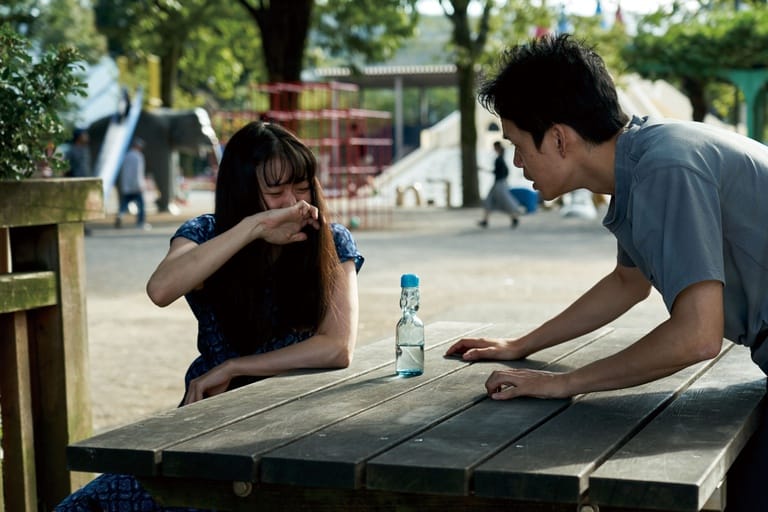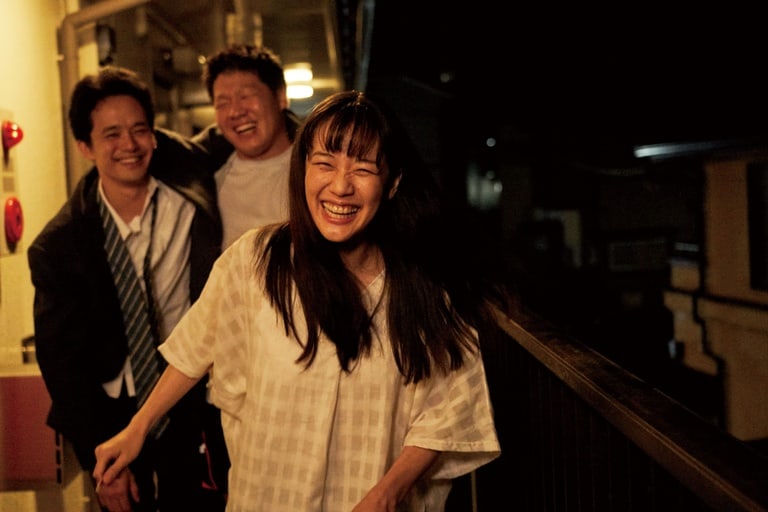Tetsuya Mariko sent ripples across the international festival circuit back in 2016, when cult sensation “Destruction Babies” showed a unique view on sociopathic violence through the “shenanigans” of Yuya Yagira. This time, he seems to go a step even further with his third feature, as the barbarity is transferred to domestic settings, in an adaptation of a TV-drama he also directed, and itself an adaptation of the homonymous manga by Hideki Arai.
Miyamoto is screening at New York Asian Film Festival

The narrative unfolds in different timelines and revolves around a rather extreme love story, between Hiroshi Miyamoto and Misako Koda. As the film begins, a beat-up but happy Miyamoto tries to make his boss forgive him for his appearance and to allow him to keep his job as a salesman. He succeeds, and also receives some weird (maybe ironic?) advice from his direct higher up, who suggests to make rivals of everyone around him, including his family. Miyamoto then introduces Misako to his parents, letting them know that they are getting married, although the fact that his mother realizes the girl is pregnant creates some friction. The two of them seem to be madly in love, but as the timeline switches to the past, a rather dark story is revealed, which involves Miyamoto fighting off Misako's ex-boyfriend, rape, and a series of brutal confrontations with Takuma Mabuchi, the son of one of his colleagues (higher up in essence), Keizo.
Tetsuya Mariko directs another film about a character locked in a cycle of non-stop violence; however, this time he also adds two other, equally disturbing concepts, that of obsessive love and of the law of the jungle. The first concept has rarely been depicted with darker colors, since it becomes obvious from the start that the relationship of the two started with her using him to protect her against her former boyfriend, but became something even worse after the rape, when revenge becomes the sole driving force for Miyamoto.
The rape, however, in all its brutal, no-punches-pulled depiction also poses a rather cruelly realistic comment (apart from the consequences of overdrinking): what can you do as a man, when someone much stronger than you threatens those you love? The answer Mariko gives is not so clear, but definitely involves intense violence, which here seems to be justified by both the outcome of the relationship, and as the sole solution in a world where calling the police seems completely out of the question. This first aspect also makes another disturbing statement, that of women needing men to protect them, without caring of the consequences or to what depths they fall in order to do so. Lastly, the fact that violence eventually leads to happiness is another statement that may not sit well with many.
This time, the build-up to the violence taking over is significant, in contrast to “Destruction Babies”, in a tactic that both makes its impact more significant but also lags a bit, with this aspect being one of the two significant faults of the film, with the other being a tendency for melodrama.
Among the most impressive aspects, on the other hand, is the way Mariko “uses” Wataru Ichinose's Takuma Mabuchi, as the medium of the law of the jungle previously mentioned. His harshly pragmatic attitude and the fact that violence always follows his appearance on screen, including one of the most shocking home-invasion scenes ever to appear on screen, and even more, a final battle that is brutally and quite disturbingly realistic, are actually the elements the whole narrative revolves around.
The presence of Yasuko on the other hand is quite perplexing. The girl is first portrayed as somewhat manipulative, then quite sweet and cool, even when confronted with the drunken, offensive attitude of Hiroshi's colleagues. Her reaction to the rape however, and particularly the “agreement” she makes with Hiroshi and the result of their relationship, especially regarding his actions, present another face, which actually remains enigmatic until the end, maybe with the exception of her need to be protected by someone. Yu Aoi is as convincing as always in a rather difficult role, maybe with the exception of a few moments of excessiveness here and there.

Sosuke Ikematsu's Hiroshi, however, is much more transparent, as a character that loves a woman and is willing to do anything to for her, including harming others and himself. His role is even more demanding physically and Ikematsu delivers on the same level with Aoi, also including the excessiveness moments. The fact the two work quite well together, in both the calm and the intense moments, is also a testament to their evident chemistry.
Hidetoshi Shinomiya's cinematography implements the overall aesthetics of the movie with a very fitting harshness, and an unprecedented realism that reaches its apogee in the final fight scene, which is definitely not for the faint-hearted. The editing induces the film with a relatively fast pace through the frequent cuts, but a bit more trimming would definitely help and the flashbacks could be easier to understand, since the only aspect that actually defines the timelines is the length of Misako's hair. Also of note is the soundtrack of the film, with the many punk songs proving a great fit for the narrative.
“Miyamoto” is a difficult film to watch, while Mariko's comments are definitely disturbing. However, the raw energy and brutal realism are still here, and deem the movie an impressive one, particularly for the ones who can see beyond the violence.
















I’m surprised that you found Yasuko “manipulative”–I thought Yu Aoi to have done a great job. Yasuko has privacy and tries to preserve agency–how else to navigate the world let alone the one that the movie creates? It’s Miyamoto who throws himself at things as is the strange one in the lot. Her role otherwise feels otherwise underwritten, unimaginative. Her relationships feel like plot more than naturalism, designed to fit the plot.
Miyamoto declares that what he’s done/doing is not about her towards the end of the movie. It’s about him. But rather than a catharsis, I think it was too on the nose. I think it’s meant to be a male meditation on toxic masculinity, that tries to account for itself, but doesn’t go far enough to imagine something outside it, just what’s wrong from the inside. The anguish and the triumph are on the same terms, and the world it paints (not just the character’s world) is the same. I have to say I found this movie well made and well acted, but ultimately incredibly indulgent.
Interesting points. Yasuko is manipulative because she uses Miyamoto to forget and be protected from her ex, she does not seem to share his feelings, at least not in the beginning.
I did not find it self-indulgent at all
I guess I find her behavior to be a natural and understandable one, again, especially given the world she inhabits. “Manipulative” has a harsh connotation to me, while it’s Miyamoto’s capital R Romantic expectations and proclamations that are the most baseless. He ignores Yasuko desires when it doesn’t align with his, pointedly immediately after the rape, and by the confession that means he’s doing it all for himself reveals that she’s practically a vessel, not even a person to her–and that’s when she decides to sign on? He’s the put-upon subject of the movie, but it’s she who has no power whatsoever.
It’s ostensibly a look at masculinity, but feels more like a product of it than a critique, however well executed it is. There’s a double disregard here, Miyamoto ignores Yasuko and so does the story. For me, especially during festival runs where one can watch many similar works, I can’t help but see this in the context all the stories that are about being a man.
I have a feeling that I’m mostly repeating myself, so thank you for indulging my comments and your consideration.
Your comments are appreciated, your passion about movies is evident. Keep them coming…